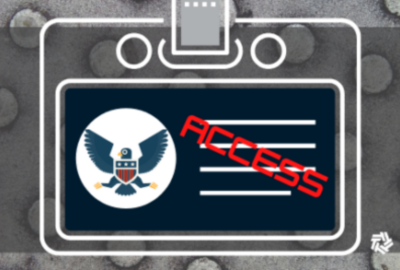Goodbye SF-86? OMB approves new ‘Personnel Vetting Questionnaire’
The PVQ takes a new approach compared to the SF-86 on screening questions around marijuana use, mental health, foreign connections and other areas.
The Standard Form-86, a long-used questionnaire for government positions requiring security clearance, is set to be phased out after the White House Office of Management and Budget approved a new form replacing the SF-86 and several other legacy forms.
OMB approved the Personnel Vetting Questionnaire (PVQ) in November, according to the latest quarterly update on the “Trusted Workforce 2.0” initiative from the Performance Accountability Council. The questionnaire consolidates the SF-86, “Questionnaire for National Security,” along with several other vetting questionnaires used for federal jobs, including public trust and non-sensitive positions.
The Defense Counterintelligence and Security Agency is now working on plans to integrate the PVQ into the new “eApp” web portal for background investigation applications. The effort is part of DCSA’s development of a new IT system, the National Background Investigation Services (NBIS).
“The PVQ interface in NBIS eApp is still in development, and we anticipate working with the Trusted Workforce executive agents to share a deployment timeline,” a DCSA spokesman told Federal News Network.
The new questionnaire includes several key updates to questions in the SF-86 and other forms. The Office of Personnel Management, which oversees the PVQ, included updates to questions on marijuana use, mental health and several other key areas.
The PVQ includes a separate section on “marijuana and cannabis derivative use,” distinct from questions about other illegal drug use. In its original public notice on the new PVQ, OPM said distinguishing marijuana use from other drugs is “in recognition of changing societal norms.”
Prior reports have shown confusion around past marijuana use policies may be dissuading people from applying for a cleared position.
The PVQ first asks applicants whether they had used marijuana or derivative substance within the last 90 days before asking more detailed questions about their prior history with marijuana.
The SF-86 currently asks applicants about all prior drug use, including marijuana, within the last seven years.
John Berry, a security clearance attorney at Berry and Berry PLLC law firm, said the new PVQ represents a “good faith effort” to reflect how many states have legalized marijuana, even if it remains illegal at the federal level.
Still, use of marijuana by federal employees remains prohibited, while past use is evaluated on a case-by-case basis. And Congress appears unlikely to amend the Controlled Substances Act in the near term.
“So I think that we’re left with liberalizing it,” Berry said on Inside the IC. “And that’s kind of what [OPM] is trying to do. But it’s still there. And I think it’s just going to be an agency-by agency decision. I think [the Defense Department] will be your most standard one, which will probably give you a little bit more leeway on things.”
Meanwhile, intelligence agencies, which typically require a higher level of clearance and a polygraph exam on top of a background investigation, are likely to be less liberal, Berry said.
“Are they really going to say 90 days and you’re good? I don’t think so,” he said. “You’re going to have polygraph, and they’re going to dive into these details, and you’re going to be telling them the same information anyways.”
Mental health updates
The new PVQ also continues an effort to de-stigmatize mental health treatment for individuals with a security clearance. Since 2016, the SF-86 has had more specific questions about hospitalization and specific diagnoses, rather than about all mental health treatment. OPM said the PVQ aims to further reduce stigma by limiting the scope of the questions even further.
For instance, the PVQ limits many of its questions on “psychological and emotional health” to hospitalizations and treatments within the past five years, rather than “have you ever” questions included in the SF-86.
Berry called the narrowing of the mental health questions “helpful.”
“I’ve been handling security clearance cases since 1999, and it used to be back in those days, depression and anxiety could trigger adjudications,” Berry said. “And so I’m just thankful to see that the forms are finally recognizing that nobody here gets out unscathed. There’s . . . a slightly bit more understanding about these health conditions.”
Foreign connections and gender-inclusive terminology
OPM also made changes to questions regarding foreign connections and activities after the Partnership for Public Service commented on the draft PVQ, arguing that many legacy questions in the SF-86 that deal with foreign influence and connections “have not been substantively updated for decades and seem to reflect assumptions about the nature of international communications, education, and business that are no longer accurate.”
For instance, the final PVQ limits questions about an applicant’s foreign contacts to those “with whom they have feelings of affection, a romantic relationship, are bound by social, moral, financial, or legal obligations or with whom they have shared information about themselves that, if known, could be used to influence them to act against the interest of the U.S. government.”
Berry said the changes help address a more interconnected world where people travel, work and study abroad.
“Especially people that have lived abroad or have gone to school abroad, you have a lot of classmates and such, and it can be difficult task to track everything down and make sure you get it right,” Berry said. “So it’s helpful to limit it more than it has been.”
And unlike the SF-86 and other forms, the PVQ doesn’t require the respondent to indicate “Male” or “Female.” OPM and the Office of the Director of National Intelligence determined the use of gender-inclusive terminology “would not adversely affect personnel vetting processes,” the agency said in its original notice.
The timeline for integrating the new PVQ across agency processes remains unclear — OPM and DCSA did not provide specific answers about when the new PVQ would go live and when the other forms would be sunset.
But Berry said he expects a steady roll out rather than an immediate one.
“Is it going be rolled out all at once? Is it going to be a consistent application of it? Are we going to be using the old forms, in some cases for a year or two? Because then it might get confusing for individuals,” Berry said. “But I doubt it’s going to be like, ‘OK, on April 5, 2024, everyone’s using the new form,’ because it doesn’t work like that.”
Copyright © 2025 Federal News Network. All rights reserved. This website is not intended for users located within the European Economic Area.
Follow @jdoubledayWFED





